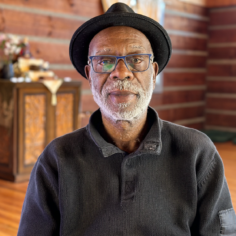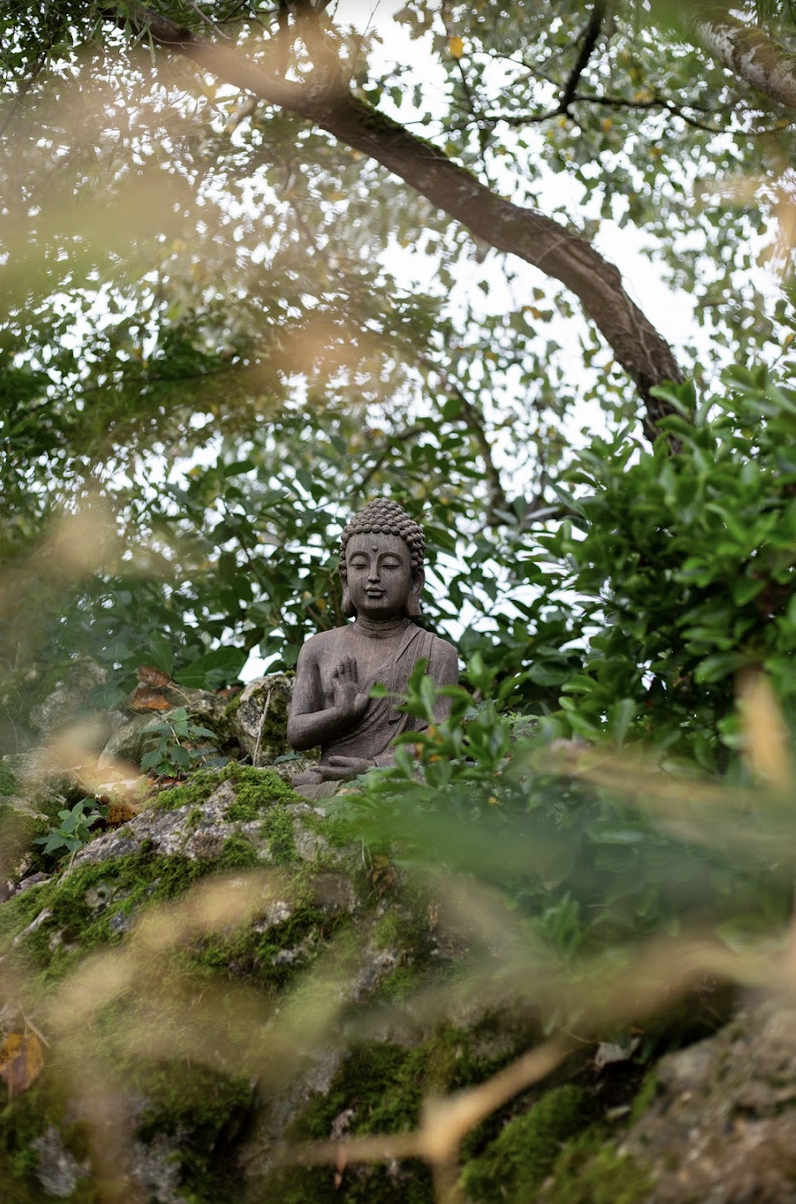By Dr. Larry Ward on
Dr. Larry Ward shares about caring for our traumatic experiences so we can fully arrive where we are needed.
It is not easy to face the suffering in ourselves or in our world. Years ago, when our house was bombed by white supremacists, the first thing Peggy and I did after we cleaned things up, and got the insurance company involved,
By Dr. Larry Ward on
Dr. Larry Ward shares about caring for our traumatic experiences so we can fully arrive where we are needed.
It is not easy to face the suffering in ourselves or in our world. Years ago, when our house was bombed by white supremacists, the first thing Peggy and I did after we cleaned things up, and got the insurance company involved, and the police, and started getting the house rebuilt, was to go straight to Plum Village. Now, why did we do this? I want to talk about why that was so important. One way to talk about it is, how can we be engaged without becoming entangled?
The body remembers
This, for me, is the fundamental challenge of a bodhisattva at this hour. I am speaking from my own experience, and my experience with beloved friends all over the planet. In the Huayan tradition that Thầy has talked so much about, the interpenetrating nature of reality means that when I go work in a village without water, my nervous system experiences living and working in a village without water and it retains the memory of thirst and deprivation. When I walk into a riot in which people are about to kill each other, afterward my nervous system still remembers the feeling of walking and wondering whether this is the last thing I am going to do, trying to get these people to stop fighting. My body remembers. And so because our bodies remember, our practice of mindfulness of the body must be elevated. We must practice the foundations, as I do every day, of walking and sleeping and breathing and eating and the joy that comes from just being present to the wonders of life. I try to make sure I don’t have a day in which I am not amazed, stunned, shocked by beauty, by kindness, by the depth of an open heart. Don’t let your life pass you by, waiting on everything to be perfect before you take your next step. Things will never be perfect. Don’t worry about that. Take your next step.
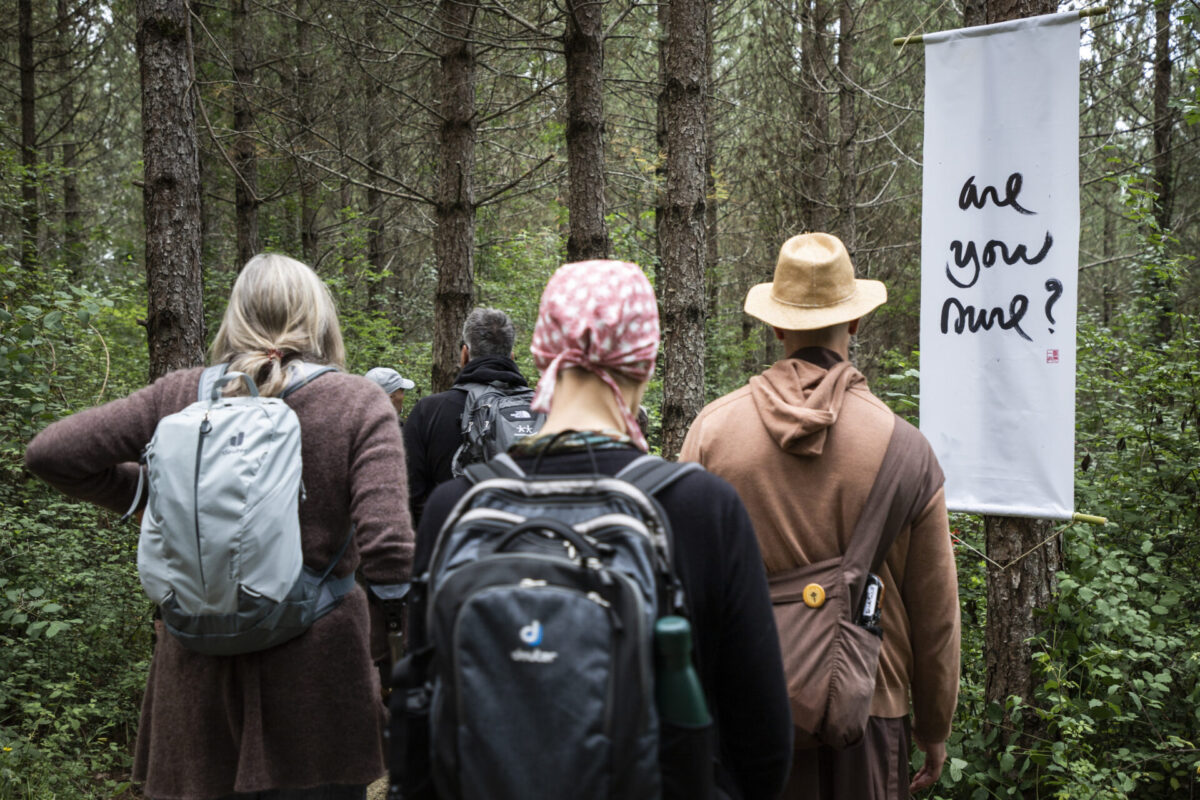
Sometimes I wake up and think of a book from long ago in which Theodore Roszak quotes a friend of his, a Trappist monk: “Everyone needs to be a monk today.” And he meant the lifestyle of monastic consciousness. A contemplative life, a quality of simplicity that allows us to recognize how we have been traumatized and to heal that trauma so we don’t leak it out onto the people around us. The circle flows. What I’ve learned in my life around the world, for which I am very grateful, is that I have to practice coming home to myself every day, all the time. If I don’t, when I step out of my practice, when I step out of the zendo that is my life and enter into the world, to care, to teach, to learn, to serve, I step into the trauma field that is always there.
So, it is very important to learn how to responsibly care for our traumatic experience. The human evolutionary response to trauma means biological dysregulation, not mental weakness. (I know some people who are mentally very strong who are also completely traumatized, so don’t be confused about that.) I am talking about the body, about things that happen below the level of cognition, before thought. Coming to this realization is a process of gradually growing enlightenment; it’s like an incomplete enlightenment. I am learning to be okay with being incomplete, and I want to keep being incomplete.
I try to make sure I don’t have a day in which I am not amazed, stunned, shocked by beauty, by kindness, by the depth of an open heart.
Some dear friends of ours were leading a retreat in Kyoto three or four years ago and they had set up a special trip for us to Koyasan, the Japanese monk Kūkai’s resting place in the mountains of Japan. We had been there several weeks, and to get to Kūkai’s resting place, you walk through Okunoin, the largest cemetery in Japan. It happened to be the second time in my life I was in a wheelchair; my knees had started complaining and so my beloved friends pushed me through the cemetery in a wheelchair, and I was able to rest while I got up-close views of gravestones from hundreds of years ago. Shoguns and all kinds of characters were buried there. We arrived at the end, and we found the temple and people chanting there. A funeral service and burial ceremony was happening for a family, and I sat there in meditation. That’s all I wanted to do, just sit, which was purely joyful and extremely peaceful for me, and on the way back I realized I had a moment in which I did not feel traumatized. I literally had a moment in my body.
I went back to Peggy, and I said, “I am feeling something, I am not sure what it is, and it is peace that’s unconditional.”
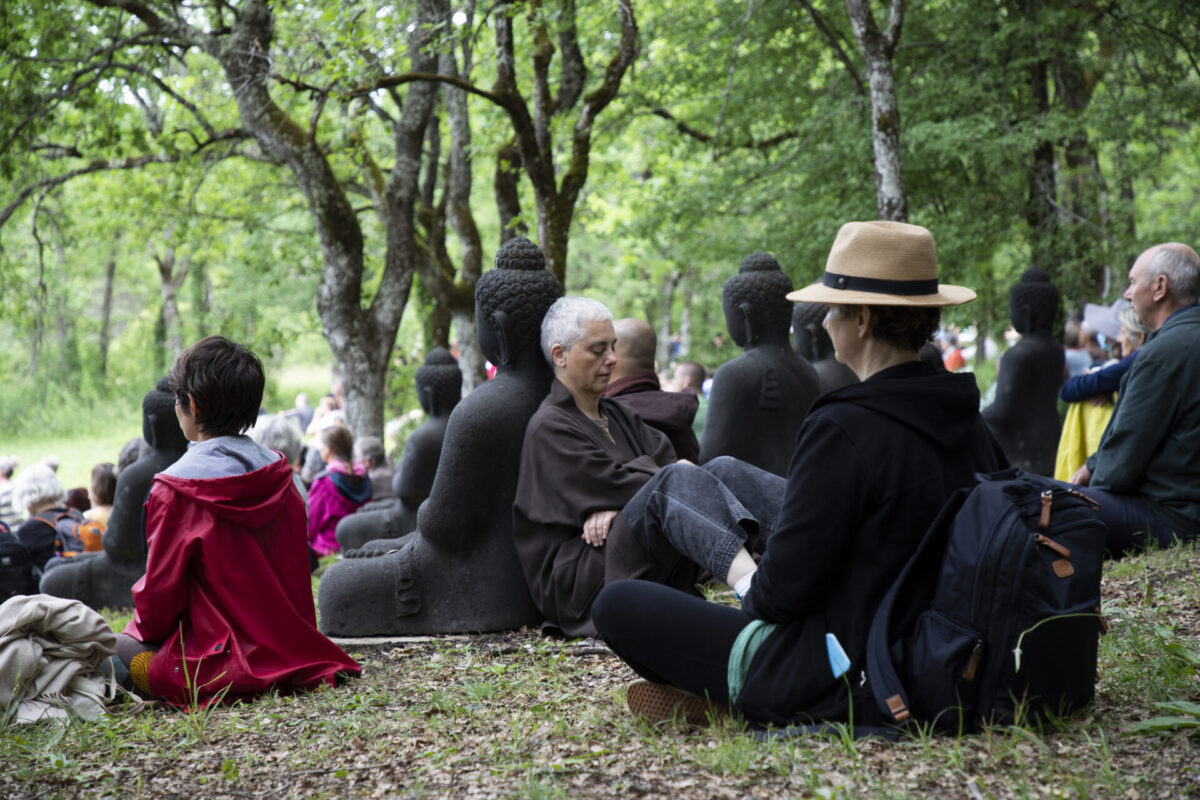
Touching trauma
So as I learn, and practice, and continue our coming home to ourselves, recognizing our own solitude, recognizing our own pain, our internal knots and our habit energies, learning how to love the one who is here now, in this moment, (and by “love”, I mean respect: to listen to, care for), that’s a part of what I have to do every day. When I wake up, before I get out of bed, I do the Five Remembrances. Somebody wrote to me and said, “God, that sounds depressing…” I do these every morning, and every morning there are little differences; a visualization will occur, and I can see myself really old. And the second thing I remember before I get out of bed is, if I put my feet on the floor without coming home to my body and mind first, the energy of the day takes away: I’ll go into motion before I go into stillness.
The Five Remembrances 1. I am of the nature to grow old. I cannot escape old age. 2. I am of the nature to get sick. I cannot escape sickness. 3. I am of the nature to die. I cannot escape death. 4. All that is dear to me and everyone I love are of the nature to change. There is no way to escape being separated from them. 5. I inherit the results of my actions of body, speech, and mind. My actions are my continuation.
The great work of all the bodhisattvas now is continuing to nourish our stillness, our mindfulness, our equanimity, so that as we engage in systems of oppression and injustice, we are not destroyed by touching the trauma they contain. And we don’t bring our unfinished business to the table. The work itself is already hard enough. Thus the first thing for me to do every morning is to practice coming home to myself and to sustain that awareness all day. I try to live a contemplative life, especially now in my practices with nature that I am really learning how to deepen.
Am I practicing with my precious life, or am I giving away my precious life?
Too many cows
My engagement in society is with groups and individuals who are working towards justice and harmony and well-being all over the planet, but in order for me to not get entangled, I have to, first, ground myself, come home to what’s here now, to who is here now. Am I practicing with my precious life, or am I giving away my precious life? The other thing I do, besides being here now, is to nourish my stillness and equanimity, to engage in the suffering. And then the third thing I am really learning how to do–this is where the Five Remembrances help–is to let go of it all. I was recently reading a quote from Ajahn Chah, with whom I have studied over many years, and he said, “Practice well, take care of your own mind, take care of your own body, engage in transforming society, but remember that whatever we do, it has clay feet: impermanence.” Thầy puts it another way: when we recognize we may have too many cows, we learn how not to hold on to that which doesn’t need to be held. Not only cows; ideas. Our beloved teacher has been a tremendous witness to the human capacity to change, grow, and learn, through the art of letting go.
Arrive in equanimity
And that is why I am here, and that is why Peggy and I went to Plum Village as soon as we could after our home was destroyed and our lives were threatened with danger. Because I realize that it is possible to grow, learn, change, and serve, to practice coming home to myself, to practice healing and transforming the suffering of others, and to practice not being confused by any of the entanglements that might arise, letting all of that go. Ajahn Chah said something like, “Whether you are happy or sad, rich or poor, you are of a nature to grow old, to have ill health, and to pass away.” So I remember this every morning, and I have discovered that when I go outside and I practice with the plants, with the hummingbirds (who seem to be really willing to practice in stillness), I touch complete joy every morning. I touch the wonders of life every day, throughout the day, so that I can hold more suffering. So that I can hold it without clinging to it, and then I can hold it and see it at its root without getting caught.
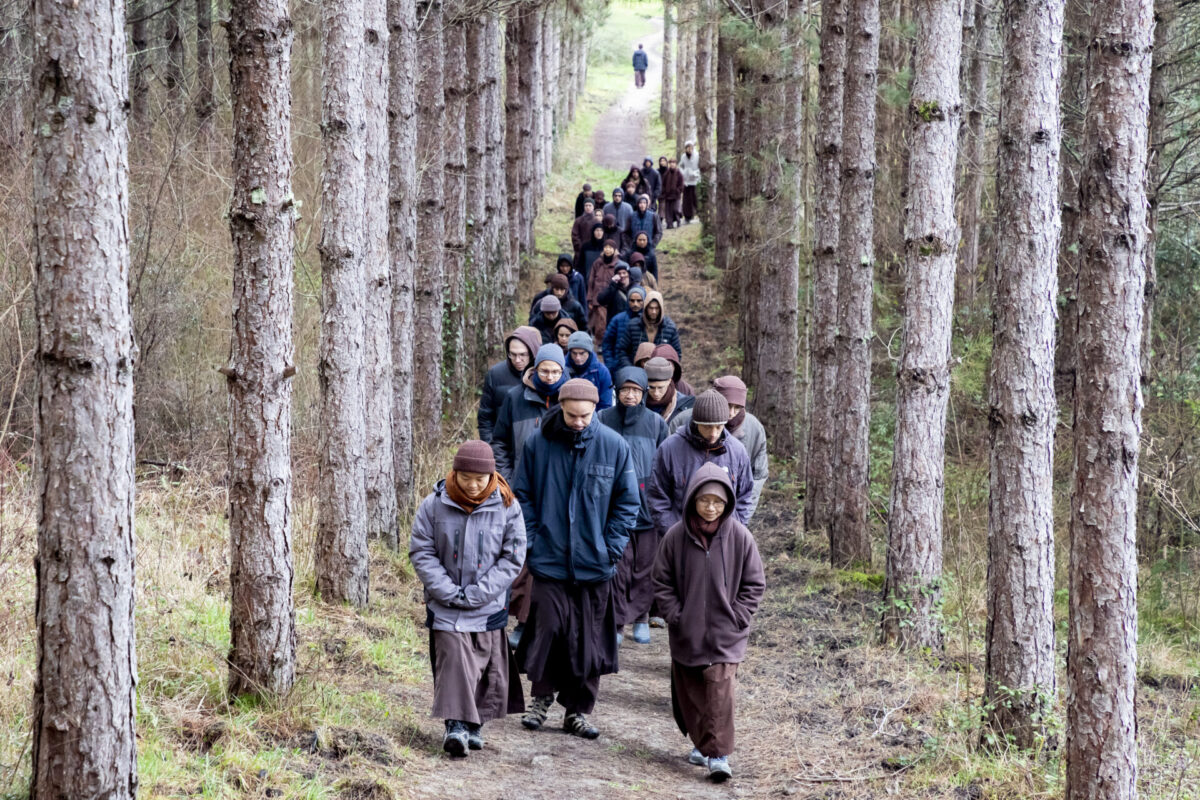
The Sutra on Complete Enlightenment describes this process of engagement without entanglement as three general methods of the bodhisattva way: shamatha practice or calming the mind; coming home; and settling, bringing stillness into your body and mind so that you can bring that stillness into your engagement outside yourself. When we engage, if we practice what our teacher is teaching us to practice before we walk out the door, we equally arrive. We arrive equally in the moments of other people’s suffering. We can arrive without judgment and blame. We can arrive with compassion and wisdom. Years ago, Thầy said that one of the marks of a Plum Village teaching is arriving. Learning how I can practice every morning and all day long is so that I can arrive in the present moment; then I take that energy of arrival and bring it to everyone I meet—into the schools I work with, the communities I engage with: to arrive equally, in equanimity.
There are many people waiting for you, who need your joy, your willingness to listen. You are needed. Our only planet, and all our sources and forms of life, are in desperate need for love without fear, without confusion, and without clinging to self. We are not being asked to solve all the mysteries of life. We are being asked not to live superficially, not to be satisfied with simply a materialistic life, a life of acquisition, a life in which things are more important than people. We are more than that. Do not be confused by different appearances of persons. I have been in so many places around the world. You have no idea how remarkable, how many different manifestations there are of everything: plants, animals, people. We keep discovering creatures we’ve never met, but one of the creatures we rarely meet is ourselves, and this is why arriving home and meeting ourselves is the foundation of an engaged and joyful life.
This is an excerpt from Dr. Larry Ward’s Dharma talk on June 26, 2021 at Deer Park Monastery. The full Dharma talk is available on the Deer Park Monastery YouTube channel. Transcribed by Giovanna Zerbi. Edited by Jess Skyleson and Hisae Matsuda.
